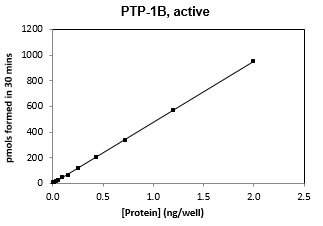PTP-1B
N-terminal GST-tagged recombinant, human PTP-1B amino acids 1-321.
Biological information
Background
PTP-1B is the founding member of the protein tyrosine phosphatase (PTP) family, which was isolated and identified based on its enzymatic activity and amino acid sequence. PTPs catalyze the hydrolysis of the phosphate monoesters specifically on tyrosine residues. Members of the PTP family share a highly conserved catalytic motif, which is essential for the catalytic activity. PTPs are known to be signaling molecules that regulate a variety of cellular processes including cell growth, differentiation, mitotic cycle, and oncogenic transformation. This PTP has been shown to act as a negative regulator of insulin signaling by dephosphorylating the phosphotryosine residues of insulin receptor kinase. This PTP was also reported to dephosphorylate epidermal growth factor receptor kinase, as well as JAK2 and TYK2 kinases, which implicated the role of this PTP in cell growth control, and cell response to interferon stimulation. GenBank NM_002827
Target class
Phosphatase
Family
Tyr phosphatase
Accession number
NM_002827.2
Target Name
PTP-1B
Target Alias
PTPN1, PTP1B, PTP-1B
Origin
Human
Theori. MW
64.1 kDa
Affinity tag
GST
Product specifications
Expression system
Expressed in E. coli
Purity
Purity 46% by SDS-PAGE and Coomassie blue staining.
Purification method
Glutathione agarose affinity chromatography
Sample Buffer
Protein in 50mM Tris/HCl pH7.5,
150mM NaCl, 10% glycerol, 0.1mM EGTA, 0.03% Brij-35, 1mM
benzamidine, 0.2mM PMSF, 0.1% 2-mercaptoethanol. Frozen
solution.
Specified activity
Refer to CoA
Application
For Research Only
Storage conditions
1 year at -70°C.
Usage disclaimer
For Research Only
Chemical data
Background
PTP-1B is the founding member of the protein tyrosine phosphatase (PTP) family, which was isolated and identified based on its enzymatic activity and amino acid sequence. PTPs catalyze the hydrolysis of the phosphate monoesters specifically on tyrosine residues. Members of the PTP family share a highly conserved catalytic motif, which is essential for the catalytic activity. PTPs are known to be signaling molecules that regulate a variety of cellular processes including cell growth, differentiation, mitotic cycle, and oncogenic transformation. This PTP has been shown to act as a negative regulator of insulin signaling by dephosphorylating the phosphotryosine residues of insulin receptor kinase. This PTP was also reported to dephosphorylate epidermal growth factor receptor kinase, as well as JAK2 and TYK2 kinases, which implicated the role of this PTP in cell growth control, and cell response to interferon stimulation. GenBank NM_002827
Compound name
Phosphatase
Catalog number
14-621
Molecular formula
CAS
MW
Ka
Percent composition
Product specifications
Physical state
Purity (HPLC 214nm)
Retention time (RP18 HPLC)
CMC
Exact mass
Stability
For Research Only
Solubility structure
Kinase Activity Assay Biological information
Background
PTP-1B is the founding member of the protein tyrosine phosphatase (PTP) family, which was isolated and identified based on its enzymatic activity and amino acid sequence. PTPs catalyze the hydrolysis of the phosphate monoesters specifically on tyrosine residues. Members of the PTP family share a highly conserved catalytic motif, which is essential for the catalytic activity. PTPs are known to be signaling molecules that regulate a variety of cellular processes including cell growth, differentiation, mitotic cycle, and oncogenic transformation. This PTP has been shown to act as a negative regulator of insulin signaling by dephosphorylating the phosphotryosine residues of insulin receptor kinase. This PTP was also reported to dephosphorylate epidermal growth factor receptor kinase, as well as JAK2 and TYK2 kinases, which implicated the role of this PTP in cell growth control, and cell response to interferon stimulation. GenBank NM_002827
Target class
Phosphatase
Family
Tyr phosphatase
Subfamily
Protein Name
PTP-1B
Protein Alias
PTPN1, PTP1B, PTP-1B
Accession Number
NM_002827.2
UniProt Number
Gene Name
Gene ID
Gene Aliases
Target Species
Human
Kinase Activity Assay Usage
Product Type
Application
Storage Conditions
1 year at -70°C.
Usage disclaimer
Kinase Activity Assay Information
Assay Type
Assay Measures
Biological Information
Background
PTP-1B is the founding member of the protein tyrosine phosphatase (PTP) family, which was isolated and identified based on its enzymatic activity and amino acid sequence. PTPs catalyze the hydrolysis of the phosphate monoesters specifically on tyrosine residues. Members of the PTP family share a highly conserved catalytic motif, which is essential for the catalytic activity. PTPs are known to be signaling molecules that regulate a variety of cellular processes including cell growth, differentiation, mitotic cycle, and oncogenic transformation. This PTP has been shown to act as a negative regulator of insulin signaling by dephosphorylating the phosphotryosine residues of insulin receptor kinase. This PTP was also reported to dephosphorylate epidermal growth factor receptor kinase, as well as JAK2 and TYK2 kinases, which implicated the role of this PTP in cell growth control, and cell response to interferon stimulation. GenBank NM_002827
Target class
Phosphatase
Family
Tyr phosphatase
Accession Number
NM_002827.2
Target Name
PTP-1B
Target Alias
PTPN1, PTP1B, PTP-1B
Origin
Human
Theoretical MW
Affinity Tag
GST
Product Specifications
Expression system
Expressed in E. coli
Purity
Purity 46% by SDS-PAGE and Coomassie blue staining.
Purification method
Glutathione agarose affinity chromatography
Sample Buffer
Specified activity
Refer to CoA
Application
Storage conditions
1 year at -70°C.
Usage disclaimer
For Research Only
Biological Information
Background
PTP-1B is the founding member of the protein tyrosine phosphatase (PTP) family, which was isolated and identified based on its enzymatic activity and amino acid sequence. PTPs catalyze the hydrolysis of the phosphate monoesters specifically on tyrosine residues. Members of the PTP family share a highly conserved catalytic motif, which is essential for the catalytic activity. PTPs are known to be signaling molecules that regulate a variety of cellular processes including cell growth, differentiation, mitotic cycle, and oncogenic transformation. This PTP has been shown to act as a negative regulator of insulin signaling by dephosphorylating the phosphotryosine residues of insulin receptor kinase. This PTP was also reported to dephosphorylate epidermal growth factor receptor kinase, as well as JAK2 and TYK2 kinases, which implicated the role of this PTP in cell growth control, and cell response to interferon stimulation. GenBank NM_002827
Target class
Phosphatase
Family
Tyr phosphatase
Accession Number
NM_002827.2
Target Name
PTP-1B
Target Alias
PTPN1, PTP1B, PTP-1B
Origin
Human
Theoretical MW
Affinity Tag
GST
Product Specifications
Expression system
Expressed in E. coli
Purity
Purity 46% by SDS-PAGE and Coomassie blue staining.
Purification method
Glutathione agarose affinity chromatography
Sample Buffer
Specified activity
Refer to CoA
Application
Storage conditions
1 year at -70°C.
Usage disclaimer
For Research Only





